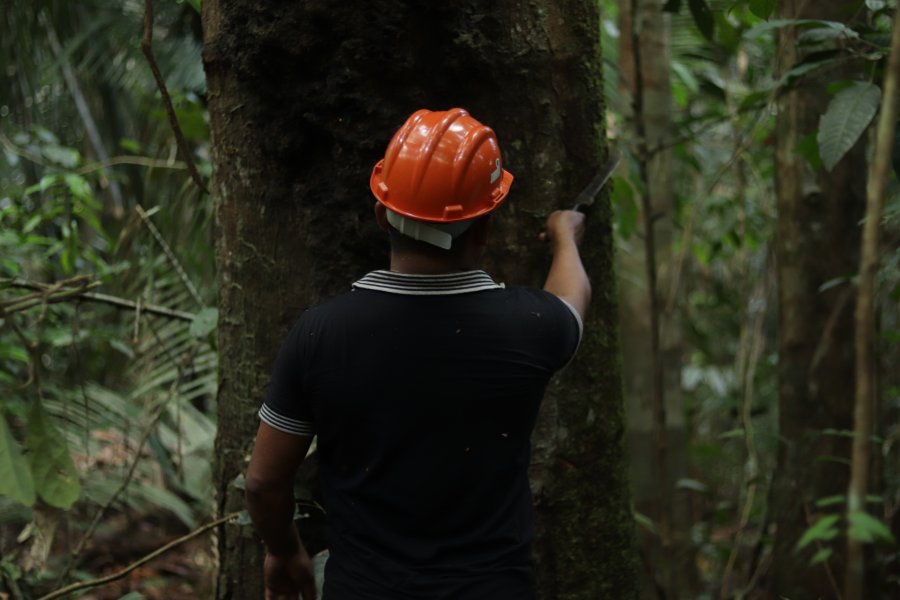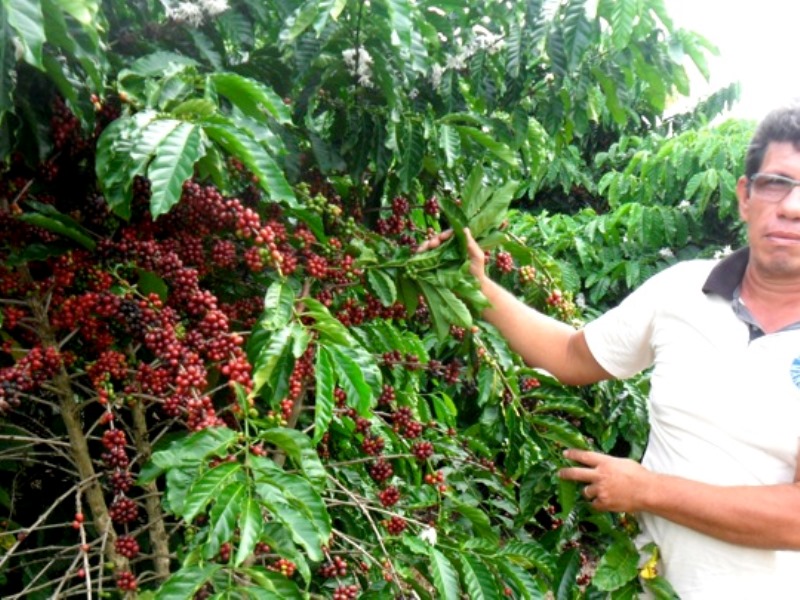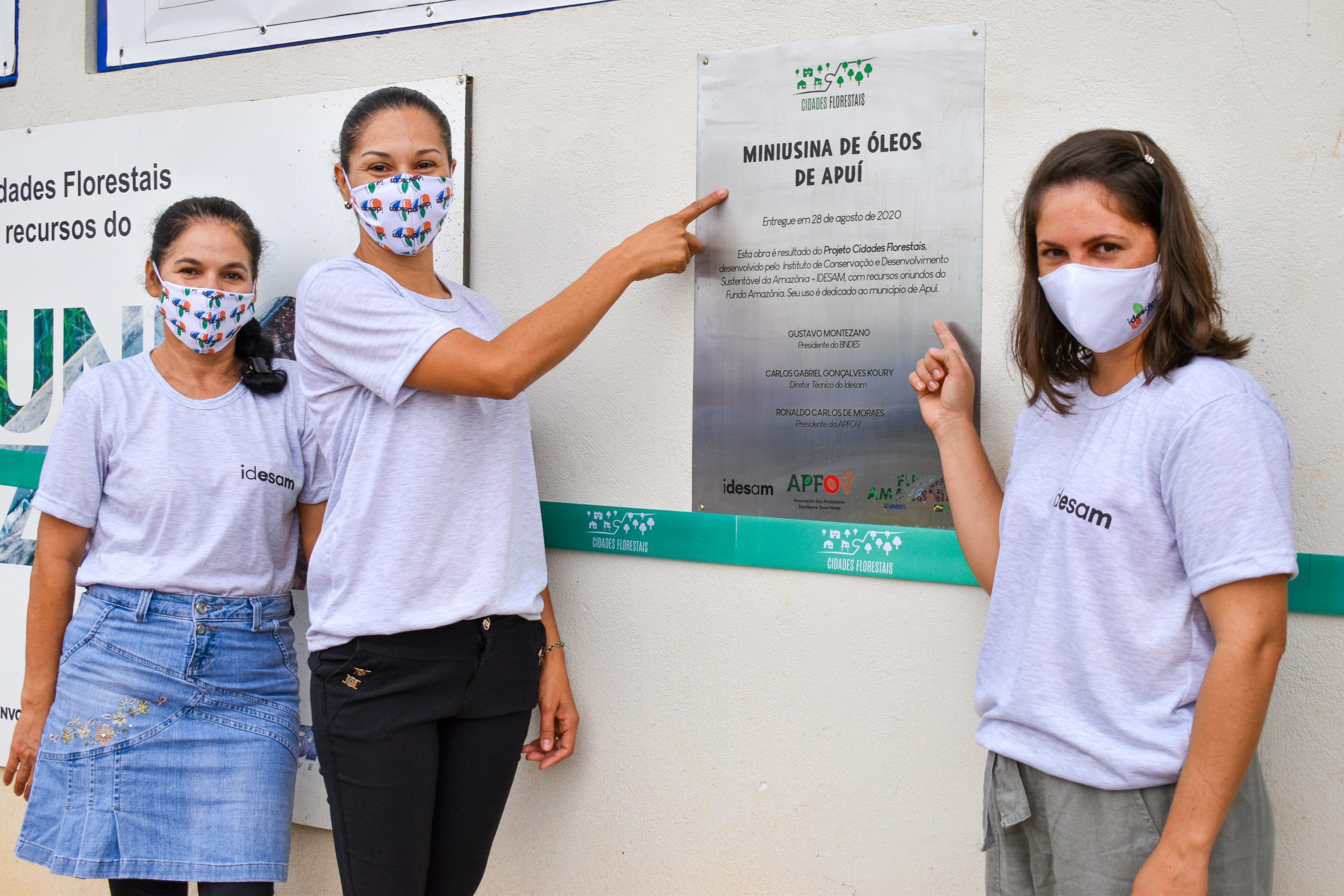
Mulheres e jovens se destacam na produção de óleos essenciais em Apuí-AM
Integração dos projetos Café em Agrofloresta e Cidades Florestais trouxe mais benefícios às famílias parceiras do Idesam na região
Por Henrique Saunier
Foto: Bruna Rozella
Há mais de uma década atuando em Apuí-AM na difusão de práticas sustentáveis voltadas às famílias que usam de recursos da floresta para gerar renda, o Idesam apoia a estruturação e operação de uma miniusina de óleos vegetais, que desde o ano passado já tem rendido os primeiros frutos positivos para produtores extrativistas do município, responsáveis por gerenciar a estrutura. De ponta a ponta na cadeia de óleos que o Idesam busca valorizar por meio de projetos como Cidades Florestais, as mulheres têm desempenhado um papel crucial no sucesso dos resultados alcançados até o momento.
Seja no campo cuidando das plantas que serão transformadas em valiosos óleos, seja na linha de produção auxiliando para que nada dê errado ou ainda nas negociações com grandes empresas para levar os produtos à prateleira do consumidor, o Idesam conta com um time diverso que se preocupa com a inclusão das mulheres e jovens em atividades estratégicas. Isso tem sido um dos motivos pela integração bem sucedida entre as famílias produtoras orgânicas do “Café em Agrofloresta” com o Cidades Florestais, que tem utilizado a matéria-prima do café verde para a produção de óleos essenciais. Além de mais uma oportunidade de geração de renda para estas famílias, essa relação comercial demonstra um alto potencial que a região possui para a produção de óleos amazônicos.
Aparecida Sardinha, coordenadora local de projetos que atua no Cidades Florestais é uma das responsáveis por direcionar os plantios de café para fornecer óleos à miniusina. Atualmente, a equipe da Coordenação Apuí do Idesam trabalha diretamente com a Associação dos Produtores Familiares Ouro Verde (APFOV), localizada no projeto de assentamento Rio Juma, e agora beneficiada com a estrutura fabril montada no município, com recursos do Fundo Amazônia/BNDES.
Só no ano passado, aproximadamente 20 sacas de café foram transformadas em óleos na miniusina, com parte da produção servindo de amostras para divulgação, além do primeiro envase oficial em frascos de 30 mililitros. Ainda feito de maneira terceirizada por uma empresa parceira (Biozer), agora os produtores se preparam tecnicamente para também realizar esta estapa essencial da cadeia. Além do óleo de café, a miniusina já realizou testes bem sucedidos de óleo de buriti e óleo essencial de pitanga – devendo realizar testes para produzir também óleos essenciais de pimenta de macaco e de patauá.
A estratégia de trabalhar na miniusina com as mesmas famílias que já produziam o Café Apuí Agroflorestal tem se mostrado uma tacada certeira. Acostumadas às técnicas agroflorestais aplicadas em seus cafezais, as 24 famílias associadas podem agora focar no cultivo de espécies que possam ser utilizadas na miniusina, que no momento passa por adequações para receber certificação da Agência Nacional de Vigilância Sanitária (Anvisa). Sardinha explica que escolher trabalhar com espécies que eles já produziam foi algo crucial.
“Um dos maiores desafios é encontrar produtos que tenham um retorno viável para os produtores. Estamos com um trabalho forte na plantação de aromáticas, mas vimos que nem todas as espécies depois poderão ser absorvidas pela usina, que pode não ter um retorno financeiro da venda daquele óleo específico. Então estamos em uma fase de pesquisas e testes para saber quais as melhores espécies para incentivar”, explica Sardinha.
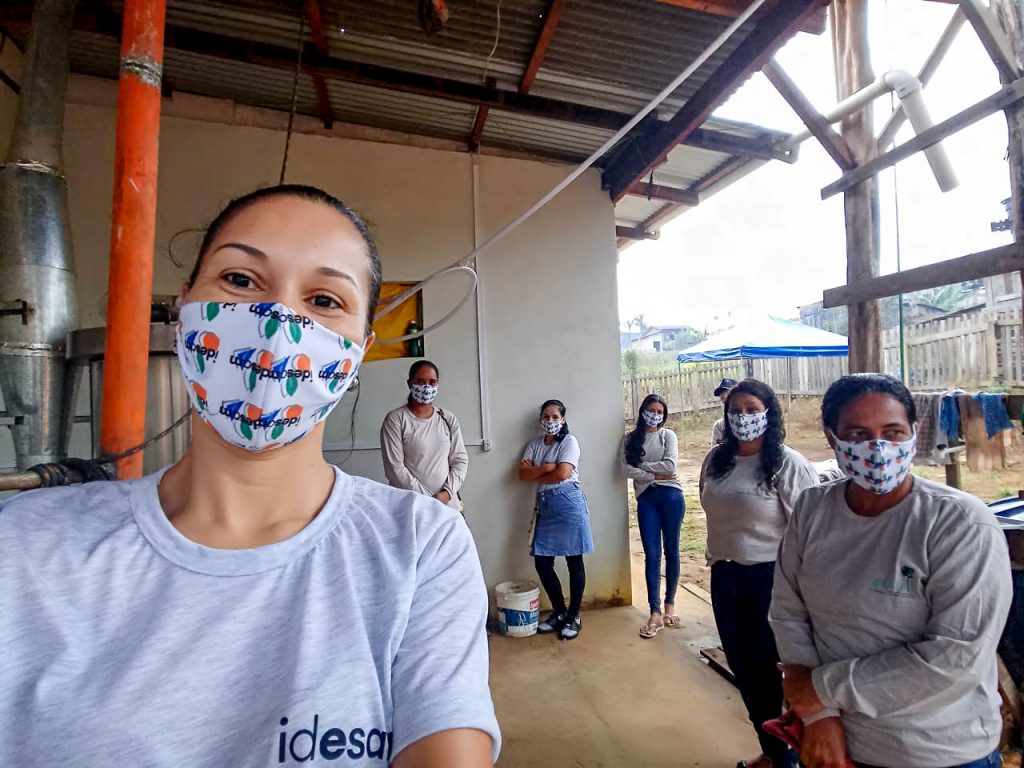
“Além de fazerem a gestão da usina, as famílias são beneficiadas com a entrega da produção. É muito comum ter essa divisão, onde o homem se ocupa com outras atividades da propriedade, então os mais jovens e as mulheres acabam ficando mais dispostas a estas atividades na usina, que hoje conta com seis operadores e provavelmente aumente com a demanda crescente de produção”, destaca Sardinha.
Produtora rural e auxiliar de produção na miniusina de Apuí, Marluci Correia divide compartilha um laço familiar em todas as atividades profissionais que desempenha. Ela relata que a experiência tem sido engrandecedora não só pelas novas técnicas de extração de óleos que está aprendendo, mas também por dividir a atividade junto com o seu filho de 21 anos, que lidera a produção na estrutura.
“Conheci o trabalho do Idesam há mais de quatro anos, por meio de reuniões na comunidade para trabalhar com café. Sempre produzimos café, mas com o Idesam passamos a produzir de maneira organizada e sem agrotóxicos, o que agrega mais valor ao nosso produto. Agora começamos a plantar cacau e também temos hortaliças, mas ainda não orgânica, pois estamos trabalhando para receber a certificação”, ressalta Marluci.
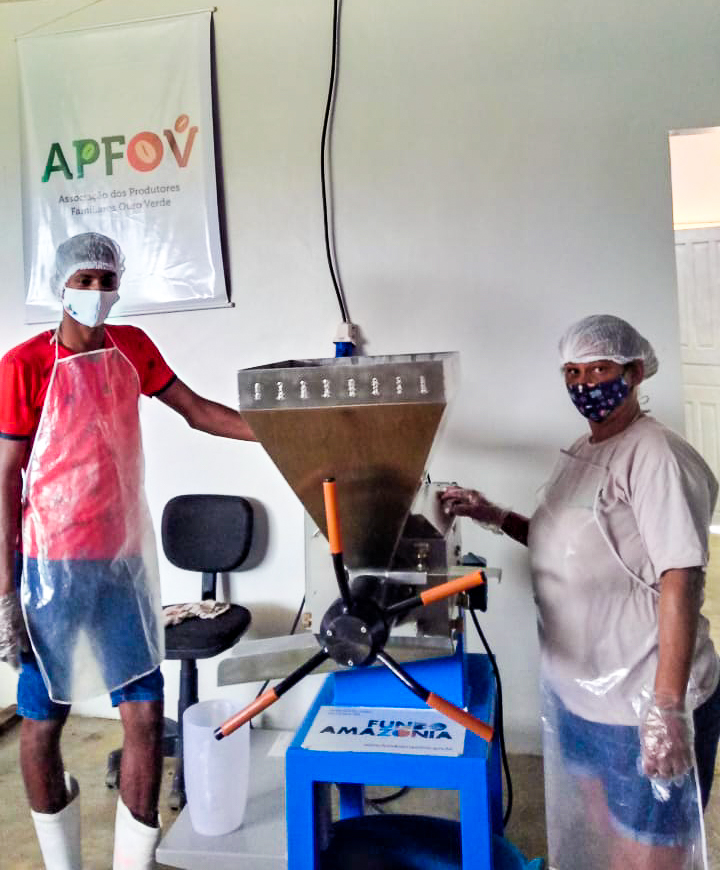
Mulheres e jovens mais qualificados
O processo de certificação orgânica participativa, que o Idesam tem ajudado a implantar com apoio da Rede Maniva de Agroecologia passa por muitas etapas de qualificação. Sem trégua da pandemia do novo coronavírus, os encontros, cursos e assistência técnica ainda precisam ser realizadas de maneira remota, conforme lembra Marina Reia, que desde o ano passado é responsável pela Coordenação Apuí do Idesam.
“Nosso plano para esse grupo de mulheres e jovens é neste primeiro momento continuar a capacitações de forma remota, via vídeo, podcasts e apostilas. Assim que a pandemia recuar, pretendemos estar mais juntos em campo para a parte mais prática de manejo das hortaliças, de aromáticas”, pontua a coordenadora.
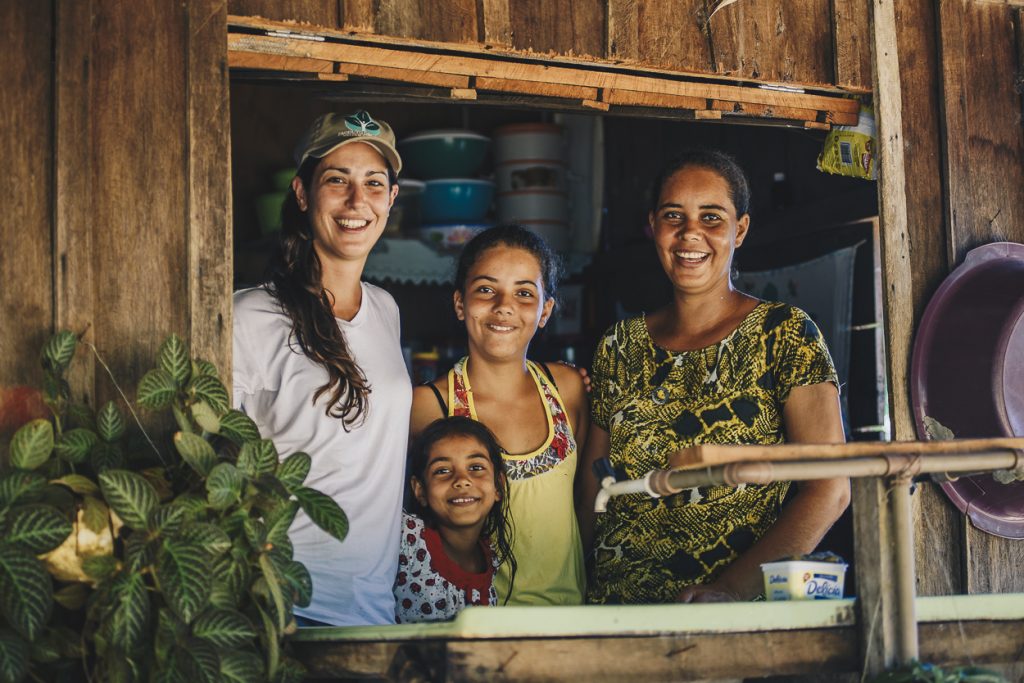
Marina Reia aposta também no avanço da certificação orgânica das famílias produtoras de Apuí, confiante que ainda há espaço para expansão da atividade na região. “Toda família que for entrar pela primeira vez no projeto e for receber implantação de SAF (Sistema Agroflorestal) ou mesmo a reforma do seu cafezal para a conversão em sistemas agroflorestais, vai receber esse pacote completo de formação para acessar a certificação orgânica. É importante ressaltar que não levamos apenas os conceitos da parte produtiva, mas também investimos muito na organização social até chegar na parte da comercialização”, reforça.
Aparecida Sardinha completa que todo o processo de treinamento pelo qual as famílias passaram (e ainda passam) para aprender a tirar o melhor proveito da miniusina agregou ainda mais ao seu trabalho. “Eu mesma que sou técnica, aproveitei muito as qualificações para aprender procedimentos e regras da Anvisa. Não é de qualquer jeito que se planta, que se extrai, é preciso conhecer diversos fatores. As capacitações em si já são muito importantes e vamos fazer ainda mais treinamentos com as famílias, com as mulheres, pois isso valoriza a própria associação”, conclui Sardinha.
Um novo mercado para óleos amazônicos
Outro elo fundamental entre as famílias produtoras e o consumidor final está nas mãos de Louise Lauschner, amazonense natural de Maués e profissional responsável por toda a parte comercial de produtos da marca coletiva Inatú Amazônia, criada para comercializar produtos da sociobiodiversidade fornecidos por associações e cooperativas apoiadas pelo projeto Cidades Florestais.
“Temos um investimento muito alto na usina e o grande desafio é fazer com que os óleos produzidos aqui sejam comercializados. O projeto Cidades Florestais já comercializou mais de R$ 1, 5milhão em óleos, então além deste investimento, já existe também um retorno para as associações e cooperativas participantes. Com a Marca Inatú, esses grupos podem vender os óleos direto para o consumidor final, que tem a garantia de estar comprando um produto amazônico vindo de um comércio justo, onde toda a cadeia está sendo remunerada da maneira ideal”, acrescenta Lauschner.

A produção de óleo de café na usina foi planejada com o objetivo de aproveitar uma cultura já consolidada no município, além da oportunidade de alto valor de mercado que o produto possui. A organização que detém a gestão da usina – a mesma que desenvolve as atividades do Café Apuí – foi responsável pela produção de 17 litros de óleo de café verde, que agora estão disponíveis para comercialização em frascos de 30 mililitros.
“Também foram realizados testes com óleo de açaí, alfavaca e citronela. Para 2021, esperamos só com café, o retorno para a Ouro Verde de cerca de R$60 mil, referentes às produções de 2020 e 2021, sem contar os retornos com a produção de óleo buriti, pitanga e óleo essencial de copaíba que serão extraídos em 2021”, adianta André Vianna, gerente do Programa de Manejo e Tecnologias Florestais do Idesam e coordenador do Cidades Florestais. Além da usina de óleos gerida pela Ouro Verde, o Idesam também presta assessoria técni ae de gestão a ASAGA, associação de moradores da Projeto de Assentamento Agroextrativista que tem gerado R$300 mil por ano a seus associados em vendas de óleo de copáiba.
Para o Secretário Municipal do Meio Ambiente de Apuí, Domingos Bonfim, as pessoas esquecem que o município, antes do projeto de assentamento, era formado por comunidades tradicionais. “Com a criação do assentamento, meio que algumas atividades foram ficando esquecidas, não foram priorizadas por muito tempo, como é o caso do extrativismo. A usina vem a atender essas comunidades que ainda se ocupam do extrativismo e, além disso, traz oportunidade para o cultivo de outras espécies que sirvam de matéria-prima para a produção de óleos. É muito importante que essa iniciativa ganhe escala em Apuí, pois temos muita demanda para esse tipo de empreendimento”, reforça.
Sobre o CIDADES FLORESTAIS e CAFÉ APUÍ AGROFLORESTAL
Oitavo município do Brasil com a maior taxa de desmatamento decorrente da produção pecuária insustentável e sem ganhos sociais, Apuí/AM se tornou o cenário ideal para a implantação de um programa voltado à regeneração de terras degradadas. Por meio da iniciativa de resgate e valorização das tradições da agricultura familiar, aplicando técnicas de Sistemas Agroflorestais (SAFs), desde 2012 o Idesam e agricultores locais trabalham juntos no projeto Café em Agrofloresta. O projeto oferece todo um suporte aos produtores, desde a coleta das sementes para produzir as mudas até a comercialização do café. Com todo esse trabalho de apoio na cadeia local, o projeto gerou dois produtos: o Café Apuí Agroflorestal (o primeiro do tipo na Amazônia) e o Café Apuí Agroflorestal Orgânico, que despontam como uma alternativa sustentável de geração de renda para conter o desmatamento. Para mais informações, acesse https://idesam.org/cafe-em-agrofloresta/
Iniciado em 2018, o Cidades Florestais tem como propósito promover a economia florestal de municípios do interior do Amazonas. Por meio do fomento a cadeias produtivas florestais, madeireiras e de óleos vegetais, a iniciativa tem beneficiado comunidades em 09 municípios do Amazonas. As ações do projeto são desenvolvidas pelo Idesam, com apoio do Fundo Amazônia/BNDES. Atualmente, 13 organizações sociais participam ativamente das ações, que incluem a implantação de plataforma digital e aplicativo de apoio à gestão da produção comunitária. Entre as iniciativas planejadas e realizadas pelo Cidades Florestais estão a aquisição de novos equipamentos e maquinários para a atividade florestal, instalação de uma Rede de Óleos da Amazônia, incluindo a construção de duas novas mini usinas de extração de óleos vegetais, com apoio estrutural e gerencial a outras três usinas já existentes. Para saber mais, acesse https://idesam.org/cidades-florestais/


